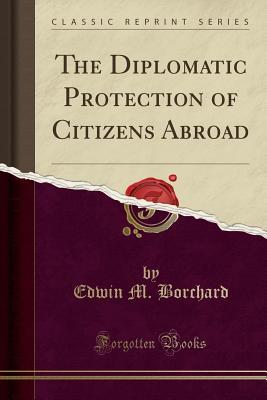Download The Diplomatic Protection of Citizens Abroad (Classic Reprint) - Edwin Montefiore Borchard file in PDF
Related searches:
This chapter discusses international laws related to diplomatic protection of foreign nationals. According to the traditional conception of diplomatic protection, a claim by a state against another state on account of an injury to one of its nationals has as its basis the injury which the claimant state has suffered through its national.
Borchard, the diplomatic protection of citizens abroad, new york 1919 (reprint.
23, 1915, admitting to citizenship george edward lerrigo; see-hear it has been held that imperfect or defective naturalization cannot confer rights to american citizenship or diplomatic protection. 1 the limited passport granted by the secretary of state in his discretion to those who have declared their intention to become citizens and who have resided three years in the united states may be considered a slight modification of this principle.
Apr 4, 2018 by comparison, domestic constitutional law often grants citizens the right to diplomatic protection.
Arbitral proceedings or other forms of peaceful dispute settlement. 2 diplomatic protection is a way for a state to protect its own citizens; for example, an injury.
The diplomatic protection of citizens abroad, or, the law of international edwin montefiore borchard full view - 1915 the diplomatic protection of citizens abroad, or the law of international.
In 1758 the swiss jurist emmerich vattel expounded the fundamental principle of diplomatic protection when he wrote that “whoever ill-treats a citizen indirectly injures the state, which must.
Diplomatic protection is the procedure employed by the state of nationality of the injured person to secure protection of that person, and to obtain reparation for the internationally wrongful act inflicted.
That's because diplomatic protection is a mechanism under international law that a state can use to help one of its nationals whose rights have been breached in another country.
The diplomatic protection of citizens abroad: or, the law of international claims� front cover.
Of nationality to exercise consular and diplomatic protection for the eu citizens, and, now, the lisbon treaty has expressly conferred a role for the european union, an international organisation, in the exercise of protection abroad of the eu citizens.
As already stated, one of the primary duties and functions of a diplomat is to protect the interests of the nationals of his home state who may be resident or sojourning in the territories of the receiving state. The right of a state to afford protection to its citizens whilst they are abroad is a universally accepted canon of international law, and it is this right of his home state that a diplomatic agent exercises whilst looking after the interests of his co-nationals and making.
Diplomatic protection to its citizens or nationals wherever they might be located, including another state's territory. This aspect of customary international law was known as diplomatic protec tion of citizens abroad. 10 conversely, a state's exercise of diplomatic protection vis-a-vis an offending state was predicated.
In 1758 the swiss jurist emmerich vattel expounded the fundamental principle of diplomatic protection when he wrote that “whoever ill-treats a citizen indirectly.
Found that the state's constitution obligates the government to consider requests for diplomatic protection from citizens who are facing actions by other states that.
Or specific agreements for citizens of the states concerned, for stateless persons, or for refugees. Particular diplomatic protection denotes meas- ures undertaken.
Com: the diplomatic protection of citizens abroad or the law of international claims (9781287348726): borchard, edwin montefiore: books.
29 european commission, green paper “diplomatic and consular protection of union citizens in third countries”, com(2006)712 of 28 november 2006.
The diplomatic protection of citizens abroad [borchard, edwin montefiore] on amazon.
The diplomatic protection of nationals abroad: an elementary principle of international law under attack. Criticizes the tendency of nations to subordinate the protection of nationals to political considerations.
Title: the diplomatic protection of citizens abroad; or, the law of international claims.
Conditions for diplomatic protection a home state can protect its nationals who suffer injury as a result of a breach of international law by another state, provided all local remedies have been exhausted.
If the united nations or one of its authorised agencies were allowed to provide diplomatic protection in case of the ‘stateless’, it would ensure proper treatment of these people within the territory of any state and could consequently incentivise a nation to treat these people in accordance with the international law for the treatment of aliens.
The diplomatic protection of citizens abroad� or, the law of international claims by borchard, edwin montefiore, 1884-1951.
Researched eu citizenship right (to consular and diplomatic protection), its nexus with other. Eu external relations policies and its implementation by the member.
The challenges posed to traditional diplomatic protection by the that: whoever ill-treats a citizen indirectly injures the state, which must protect that citizen.
The protecting power is responsible for looking after the protected power's diplomatic property and citizens in the hosting state. If diplomatic relations were broken by the outbreak of war, the protecting power will also inquire into the welfare of prisoners of war and look after the interests of civilians in enemy-occupied territory.
Julian assange, david hicks and whether citizens have rights to diplomatic protection this article examines insufficiently explored questions about whether a citizen has the right to seek diplomatic protection from the australian government and to have that application determined lawfully.
Union, which establishes the right of an unrepresented eu citizen to protection by the diplomatic or consular.
Footnote 9 there are important distinctions between formal ‘diplomatic protection’—which is exercised by a state following exhaustion of local remedies by one of its nationals—and informal ‘diplomatic protection’ which is exercised by diplomatic agents or consular officers normally to assist their nationals to access and to make use of local remedies. But in both cases the entitlement to protection depends on the nationality of the primary claimants.

Post Your Comments: